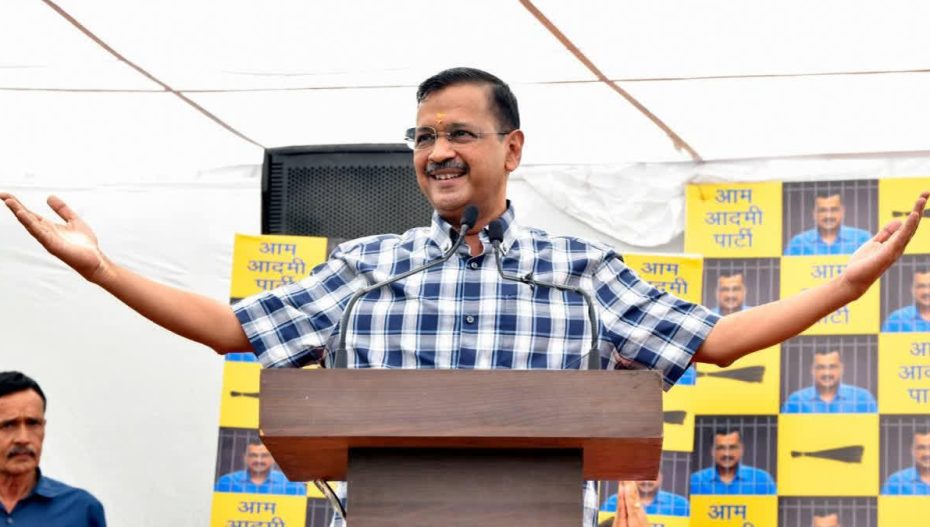Arvind Kejriwal has got very little attention for what he may have done to derail BJP’s winning streak in Uttar Pradesh. The impact of one of Kejriwal’s campaign speeches has been overlooked by many analysts. Both the seats won and the vote share of the BJP in the largest state of the country dropped in the phases that voted after Kejriwal’s speech about CM Yogi Adityanath.
Of course, different reasons have been touted for the BJP’s sizeable loss of majority in the Lok Sabha elections—from voters punishing Hindutva to hubris to voters desiring a strong opposition to RSS sitting it out to Adityanath’s non-cooperation to Akhilesh Yadav’s astute ticket distribution. The phrase ‘bheetar ghaat’ (internal sabotage) is doing the rounds too. There is perhaps some truth in all of these. But something else happened bang in the middle of the seven-phase election campaign that may have played a role too.
On 11 May, the jailed politician Kejriwal gave a speech that shocked many. He had uttered aloud what had only been said in conspiratorial whisper networks in Lutyens Delhi until then. He said two things—one, that Modi has to contend with the 75-year age limit he himself set for the party; and two, that Modi and Amit Shah will unseat UP’s popular CM within two months of coming to power.
“If they win this election, they will change the CM of Uttar Pradesh within two months,” Kejriwal said at a public gathering a day after he was released on bail from prison.
Phase four of voting took place on 13 May, two days after this speech.
But Kejriwal didn’t stop there. He repeated it on 16 May at a joint press conference with Samajwadi Party chief Akhilesh Yadav. This time, in Lucknow. And it was covered widely by local UP media.
There is only one person who could prove to be a thorn in the way of Amit Shah and that is Adityanath. They have now decided to remove Yogi Adityanath within two months if their government is formed,” he said.
Both his speeches played on many political WhatsApp groups, social media and front pages. It was either dismissed at that time as typical bombastic Kejriwal-speak or as a sign of his desperation. CM Adityanath himself reacted, saying that when a person goes to jail, his brain starts to backslide.
The reaction among Modi detractors in the BJP to his comment on the 75 age limit was one of dismay. By saying it loud prematurely, one BJP member told me privately, Kejriwal had unwittingly thwarted the question that they hoped would arise organically later, from within the party.
The second utterance about Yogi Adityanath had a different kind of impact on UP voters. It may have frightened a number of Yogi voters in Uttar Pradesh. They either stayed home or voted for another party.
The slide in the BJP tally in UP in the 2024 Lok Sabha election has shocked many analysts. The state has been the fountainhead of BJP’s dizzying growth in the past decade; it has a very popular CM in Adityanath; it is the heart of BJP’s ‘double-engine’ template; and it is here that the Ram Mandir was supposed to shore up the base.
Here is how Arvind Kejriwal’s Yogi Adityanath speech on 11 May cleaved the voting behaviour in UP.
Three phases of voting in the state had already taken place by 11 May. Voting in the remaining four phases, including in the Faizabad Lok Sabha constituency of Ayodhya temple and in the Purvachal region, was to happen after that.
The BJP had contested 24 seats in UP before 11 May and won 12. It contested 51 seats after the speech and won just 21. The BJP’s vote share in the seats it competed in also dropped from 46.07 per cent to 42.9 per cent in these before-and-after periods.
For comparison, let us look at the last Lok Sabha elections in UP. In 2019, BJP won 17 of the first 24 seats. In the second set of 51 seats, it won 44. The massive drop in the seats that went to poll post-speech this year is evident.
If we were to say that Kejriwal’s 11 May speech wouldn’t have travelled across UP fast enough to impact the voting on 13 May, look at just the last three phases on 20 May, 25 May and 1 June. The drop is evident in this set too.
In the four phases before 16 May (when Kejriwal raised the issue in Lucknow again), BJP won 20 out of 37 seats it contested, with a vote share of 45.5 per cent. In the last three phases, BJP won just 13 of the 38 seats it contested, with a vote share of 42.37 per cent.
It may not have been Adityanath but his voters who damaged the BJP’s chances, by fearing that their leader may be plucked out of power.
This is obviously just one of the many factors that go into influencing voter behaviour. But it is one that has been largely ignored, mostly because Kejriwal wasn’t seen as a significant player in this election, as the AAP results showed. The old truism of correlation is not causation is, of course, applicable here as well. But the numbers pre and post-11 May deserve scrutiny.
Kejriwal is back in prison now. His party has crashed in Delhi and Punjab. His credibility and staying power are now in question. But his brief ‘day out’ may have done just what he is known to do—disrupt the politics as usual.
Also Read: 9 Pilgrims Dead, 33 Hurt After Terrorists Fire At Bus In J&K












